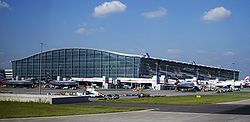Four FREE - International Shipping Quotes to London, England
With the help of internationalShipping.com international shipping to London, England can be so much easier! The Best International shipping Companies in the country will compete for your move to London, England. You will receive up to four free London, England moving quotes. The information you provide on this web site will only be used for your upcoming move from The United States of America (U.S.A.) to London, England and will not be transferred or sold to any other vender's .
London, England

England International airport.
London Airport
London England
London United Kingdom
London is the capital of England and the United Kingdom. It is the
largest metropolitan area in the United Kingdom and the largest
urban zone in the European Union by most measures. London has been a
major settlement for two millennia, its history going back to its
founding by the Romans, who called it Londinium. London's core, the
ancient City of London, largely retains its square-mile mediaeval
boundaries. Since at least the 19th century, the name London has
also referred to the metropolis developed around this core. The bulk
of this conurbation forms the London region and the Greater London
administrative area, governed by the elected Mayor of London and the
London Assembly.
London is a leading global city, with its strengths in the arts,
commerce, education, entertainment, fashion, finance, healthcare,
media, professional services, research and development, tourism and
transport all contributing to its prominence. It is the world's
largest financial centre alongside New York, has the largest city
GDP in Europe and is home to the headquarters of more than 100 of
Europe's 500 largest companies. It is the most visited city in the
world. London's five international airports make its airspace the
busiest of any urban centre worldwide and London Heathrow is the
world's busiest airport by number of international passengers.
London's 43 universities form the largest concentration of higher
education in Europe. In 2012 London became the first city to
host the Summer Olympics three times.
London has a diverse range of peoples, cultures and religions, and
more than 300 languages are spoken within its boundaries. In July
2007 it had an official population of 7,556,900 within the
boundaries of Greater London, making it the most populous
municipality in the European Union. The Greater London Urban Area
(the second largest in the EU) has a population of 8,278,251. while
the metropolitan area (the largest in the EU) has an estimated total
population of between 12 million and 14 million.
London contains four World Heritage Sites: the Tower of London; the
Royal Botanic Gardens, Kew; the site comprising the Palace of
Westminster, Westminster Abbey and St. Margaret's Church; and the
historic settlement of Greenwich (in which the Royal Observatory
marks the Greenwich Meridian (0° longitude) and GMT). The London
Underground network is the oldest underground railway network in the
world and the most extensive after the Shanghai Metro.
Economy of London, Media in London, and Tourism in London
London generates approximately 20% of the UK's GDP (or $446
billion in 2005); while the economy of the London metropolitan
area—the largest in Europe—generates approximately 30% of the UK's
GDP (or an estimated $669 billion in 2005). London is one of the
pre-eminent financial centers of the world and vies with New York
City as the most important location for international finance.
London's largest industry is finance, and its financial exports make
it a large contributor to the UK's balance of payments. Around
325,000 people were employed in financial services in London until
mid-2007. London has over 480 overseas banks, more than any other
city in the world. Due to its prominent global role, London's
economy has been affected by the global financial crisis of
2008–2009. The City of London estimates that 70,000 jobs in finance
will be cut within a year.
More than half of the UK's top 100 listed companies (the FTSE 100)
and over 100 of Europe's 500 largest companies are headquartered in
Central London. Over 70% of the FTSE 100 are located within London's
metropolitan area, and 75% of Fortune 500 companies have offices in
London. The City of London is home to the Bank of England, London
Stock Exchange, and Lloyds of London insurance market. Along with
professional services, media companies are concentrated in London
and the media distribution industry is London's second most
competitive sector. The BBC is a significant employer, while other
broadcasters also have headquarters around the City. Many national
newspapers are edited in London.
Tourism is one of London's prime industries and employs the
equivalent of 350,000 full-time workers in London in 2003, while
annual expenditure by tourists is around £15 billion. London
attracts almost 15 million international visitors per year, making
it the world's second most visited city after Paris. London attracts
27 million overnight-stay visitors every year. The Port of London is
the second-largest in the United Kingdom, handling 53 million tonnes
of cargo each year
Heathrow Airport has more international passenger traffic than any other airport in the world.


